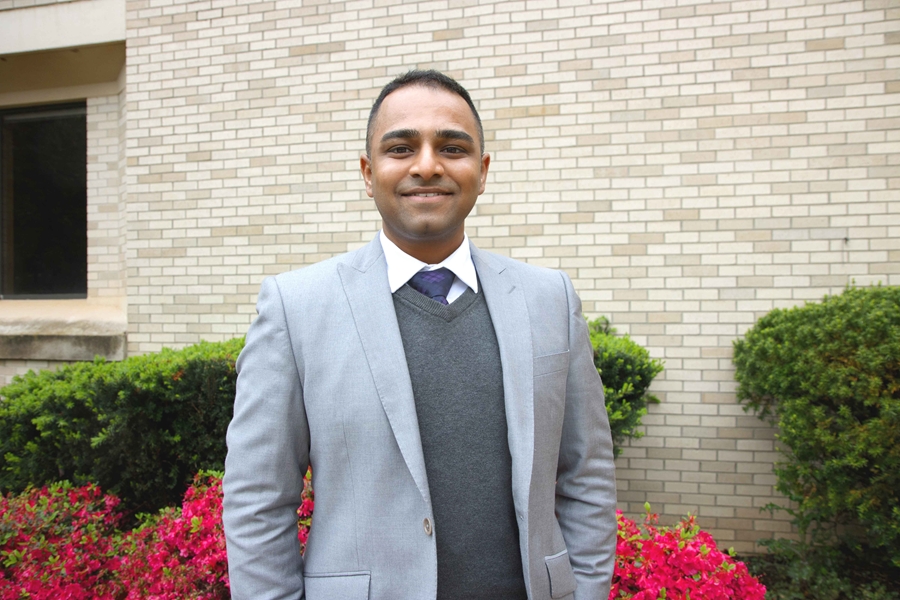A new study by a U of A information systems researcher and his colleague at the University of Waikato in New Zealand shows that COVID vaccine trials conducted in geographic locations with low infection rates had higher efficacy results, compared to trials in locations with high infection rates.
Puzzled by efficacy rates of approved COVID-19 vaccines ranging from 95 to 45 percent, Abhijith Anand, assistant professor in the Sam M. Walton College of Business, and Rajeev Sharma, professor at the University of Waikato in New Zealand, wondered if the prevalence of COVID-19 infection rates at the locations where pharmaceutical companies conducted trials might have had something to do with the differences in observed efficacies.
The researchers based their hunch on the fact that higher infection rates generally imply more mutant strains, which are likely to lead to more breakthrough infections and, consequently, reduce the efficacy of the vaccines observed in the trial.
“A lot of important decisions were being made by legislators, politicians and even the general public based on the reported vaccine efficacy numbers,” Anand said. “The reported vaccine efficacy numbers varied a lot across different vaccines. We were interested in why there was a disparity.”
Using data from the World Health Organization, McGill University, London School of Hygiene & Tropical Medicine Vaccine Centre, scientific publications, clinicaltrails.gov and others, Anand and Sharma tracked the pharmaceutical companies that had reported efficacy results from Phase 3 trials of their COVID-19 vaccines. The researchers then pulled all publicly available data on the pharmaceutical companies, focusing on location, conduct and efficacy results of Phase 3 trials.
The database that Sharma and Anand compiled represents the “entire current publicly available global evidence” on the efficacy of approved SARS-CoV-2 vaccines.
Relying on the data, the researchers examined whether there was a connection between the prevalence of COVID-19 infection rates at trial sites and the efficacy of COVID-19 vaccines. Geographic location was found to have a significant association with the observed efficacy of COVID-19 vaccines. Vaccine trials conducted in locations with a low infection rates reported higher efficacy, while trials conducted in locations with high infection rates reported lower efficacy.
The findings have important implications for shaping public policy, patient care and individual choices. Public health organizations advise individuals, organizations, medical professionals and governmental agencies about the efficacy of vaccines based on the results of clinical trials conducted by pharmaceutical companies. That advice is often the launching point for legislation and/or policies for the public, corporations, schools, medical clinics and governmental oversight.
Most of the advice comes from well-established and respected governmental agencies such as the Centers for Disease Control, Food and Drug Administration and the World Health Organization, which also work in conjunction with pharmaceutical companies that develop and test vaccines.
The researchers argued that vaccine efficacy can be validly interpreted only in conjunction with the level of pandemic prevalence, and that Phase 3 trials should include analysis of participant samples of mutant strains, which could lead to breakthrough infection and a high level of the virus.
“When efficacy results of Phase 3 trials are reported, they should include the level of pandemic prevalence at the trial locations,” Anand said. “That would provide more meaningful information for policy makers, as compared to the current practice of reporting efficacy results only.”
The researchers’ study was published in PLOS ONE, a Public Library of Science publication.
About the University of Arkansas: As Arkansas' flagship institution, the U of A provides an internationally competitive education in more than 200 academic programs. Founded in 1871, the U of A contributes more than $2.2 billion to Arkansas’ economy through the teaching of new knowledge and skills, entrepreneurship and job development, discovery through research and creative activity while also providing training for professional disciplines. The Carnegie Foundation classifies the U of A among the few U.S. colleges and universities with the highest level of research activity. U.S. News & World Report ranks the U of A among the top public universities in the nation. See how the U of A works to build a better world at Arkansas Research News.
Topics
Contacts
Abhijith Anand, assistant professor
Department of Information Systems
479-575-5929,
Matt McGowan, science and research communications officer
University Relations
479-575-4246,
